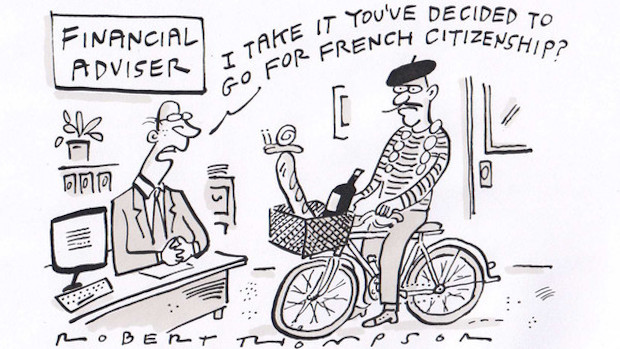Brexit: the impact on brits that live, work and own property in France
Hardly had the result of the UK's Referendum set in amongst the electorate before the political fall-out began.
It is by no means any easier to predict just what the new European landscape will look like, not least given the volatile state of UK politics at the moment.
But amidst all of this political farce, we must now look to see what the future will bring, and more importantly for Francophiles, what impact the result will have on our ability to live, work and own property in France. What will happen to those who already own property, who have already retired, who already have work, to the southern side of the ever-widening gulf that is the English Channel (should we not now call it the 'European Divide')?

The wider scenario.
At the time of writing, there are even a number of challenges to the status of the Referendum result: whether there should be a second Referendum on the grounds that the first was fuelled by untrue assertions; whether the will of the people is sufficient to allow the Prime Minister to use her constitutional prerogative to serve notice in accordance with the terms of the notorious Article 50 of the Lisbon Treaty; or whether in fact only new legislation could authorise the notice being served. If it transpires that the last of these is the only real option for serving notice to quit the EU, there could be great difficulty in passing the necessary law through the Houses of Parliament, given that the House of Commons is substantially in favour of remaining in Europe.
And as our new Prime Minister, Theresa May, was not in favour of the Leave campaign, then we can realistically expect the passage to leaving the EU will continue to be just as rocky from here, despite her recent assertions.
None of this, though, answers the main question of what is going to happen. Or perhaps it does: there is so much that remains to be understood at the present time, so much conjecture as to where we will be heading, that we cannot with any certainty explain the consequences. We can, though, consider some of the current views, and see what could happen under these. We do know that nothing will happen in practice for at least two years, and quite possibly longer.
Much has been made – rightly so – about the form of the new relationship between the UK and the remainder of the EU going forwards: as has been widely discussed departure from the EU depends upon service of the Article 50 notice, following which the UK would exit within two years. Within that two year period we should have reached an agreement with the EU about our future status. Negotiating a whole range of trade deals with other countries and organisations will clearly not be finalised in that time: we should, though, be able to reach an agreement on the main status with Europe.
Presuming that any challenges to our ability to leave are unsuccessful, and we do actually serve the Article 50 notice, perhaps the most likely, consequence would be that we would join other member states that are currently within the EEA but not the EU, in a group known as EFTA. The name itself may not sit comfortably with some who advocated departure: EFTA is an acronym of the European Free Trade Association. If the UK joins EFTA, then it will still have to adhere to certain aspects of EU law, such as freedom of movement and trade. There would be some changes, such as no longer having to observe EU rules on VAT or agriculture and fisheries. But given that one of the main tenets of the Leave campaign was to restrict the ability of people to come to the UK, this option may not win universal backing.
So another option may be to become like Switzerland, a country that has managed to negotiate a whole set of bilateral agreements, over many years. If we follow this route, we may be stuck in limbo for many years, while those agreements are negotiated. But even then, we should bear in mind that Switzerland does have a free trade agreement with the EU: again that could still face some resistance in the UK.
The implications for Brits who live, work and own property in France.
Beyond the generic hypothetical questions of what might happen across the whole of the EU, we do need to consider how this political mayhem will affect those Brits who own property in France.
It is generally accepted that there will be no impediment to a British person buying or continuing to own a property in France. Matters such as purchase taxes, the buying process or inheritance law and tax would almost certainly not change at all, following the UK’s departure (they would remain complex areas where the assistance of experienced solicitors should remain of value). So for those with a holiday home in France, it is likely that nothing substantial will change.
There is less clarity though for the expat community: those Brits who live in France. While it is almost inconceivable that they would be forcefully repatriated (not least because so many Brits live in France, and so many French nationals live in the UK that the task would be all but impossible), there is a good chance that we would see the reinstitution of a residence permit obligation. So it could well mean going back to the Préfecture to obtain a Carte de Séjour.
There will inevitably also be a need to ensure that matters such as investments, health care and pensions are considered. Such issues are of course important already, but once we have finally understood where we will stand in the future, any plans already in place may have to be reviewed.
One interesting view proposed by a French academic recently is that any British national who has been permanently resident in France for at least a year should be able to apply for citizenship. Effectively that would be reducing the time that would usually be necessary to qualify for citizenship down to about 18 months.
Much of this is, of course, conjecture. It is incumbent on anyone who has a property elsewhere in Europe, whether a holiday home or a permanent residence, to be certain that they keep fully up to date with developments in this rapidly changing world.

Posted By: Matthew Cameron. If you would like to discuss the content of this article, please contact Matthew Cameron.
If you have further questions then you can always "Ask Alex" by visiting her blog pages on the Cle France website or indeed contact our legal partners direct using the form on the Ashton KCJ - Legal services page here.
Ashton KCJ and Cle France.
We are proud to work in partnership with Ashton KCJ - Legal services. If we think our clients need further legal advice or have a specific legal question that needs solicitor involvement when buying or selling a property in France we can recommend...
Matthew Cameron and his team for expert advice.
If you are thinking of buying or selling a property in France, this should be an exciting time for you. But dealing with French legal matters can be extremely complex, adding unnecessary stress to your situation.
Ashton KCJ have a dedicated team of French property solicitors who will help you work through the legal issues and contracts. They will not only hold your hand through the whole legal process, but also work closely with Cle France and other relevant contacts on your behalf.
They have in-depth knowledge of French inheritance law and tax, as well as the subsequent implications on your UK estate. Ashton KCJ also understand and acknowledge family issues and the English implications of French property ownership.
Cle France clients can benefit from the reliable, efficient, expert advice that Ashton KCJ provide which is a service aimed at taking the stress out of your situation.
Ashton KCJ's French Legal Services Department is headed by Matthew Cameron who is a qualified solicitor with over 10 years’ experience in dealing with French legal issues. Matthew is supported by Jean-Paul Vovor, a Diplôme Supérieur du Notariat, and Sarah Walker on Wills, succession and inheritance tax issues. He is also assisted by Pauline Sakhrani.
To contact Ashton KCJ or if you have a specific question then simply complete the Enquiry form below:
We at Cle France specialise in Property for sale in France through our network of Agents and French Registered High Street Estate Agents. We have sold thousands of houses for sale in France over the years and have helped many find and buy their dream home in France.
We can also help you with everything to do with buying a house in France including getting a mortgage, organising currency exchange, renovation advice, property surveys, planning permission, French translation, opening a bank account and everything to do with French property sales.
Want to contact Ashton KCJ ? - then simply complete the Enquiry form below:
Enquiry Form - Legal Services
-
First Name: (*)
-
Last Name: (*)
-
E-mail: (*)
-
Phone number: (*)
-
Mailing List:
Subscribe
(You will be able to unsubscribe at any point)
-
Message: (*)
-
-

Refresh
-
The information that you give and that we obtain through you using this website may be used by this Company and by our partner companies only for purposes in connection with your use of this website and for marketing activities of this Company and partner companies. By using this site you confirm your consent to this. If you do not want to receive any marketing information from this Company and/or our partner companies then please notify us.
Ashton KCJ is authorised and regulated by the Solicitors Regulation Authority (Recognised Body number 45826). The information contained in this guide is of a general nature and specific advice should be sought for specific situations. We believe the information to be correct as at the time of publication, February 2013. While all possible care is taken in the preparation of this leaflet, no responsibility for loss occasioned by any person acting or refraining from acting as a result of the material contained herein can be accepted by the firm or the authors.
For everything you need to know about French property for sale visit www.clefrance.co.uk